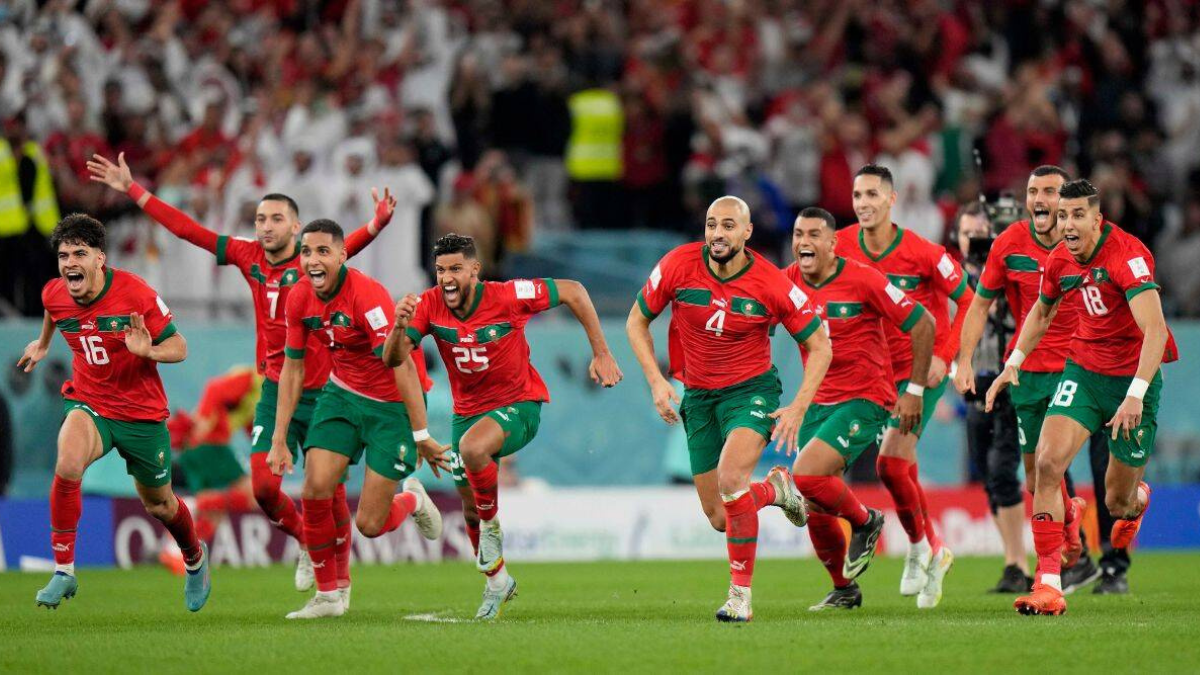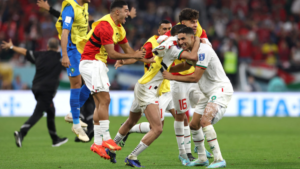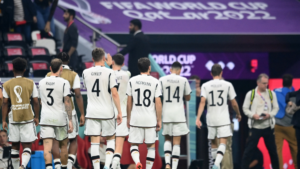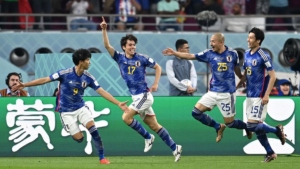Migrants from Morocco entering the Quarter-finals of the FIFA World Cup 2022 has been one of the most magical and inspirational stories of this year’s edition. From not having enough indigenous players to reaching the last 8 of the grandest event of Football, the Atlas Lions have come a long way.
What a moment for Morocco 🇲🇦 pic.twitter.com/ouiIsmAQM9
— B/R Football (@brfootball) December 6, 2022
If we go back to 2018 FIFA World cup at Russia, Morocco had secured qualification for the first time in 20 years but the national side was still in a situation of concern. They did not have any particular individual who was capable of influencing the results in Morocco’s favor. At that time the Africans were under current Saudi Arabia head coach Herve Renard – a well known name in the Continent who has guided Zambia and Cote d’Ivoire towards AFCON (Africa Cup of Nations) glory in 2012 and 2015 respectively.
Despite Renard’s success at the continental cup, he could not replicate the same feat as Morocco bowed out of the World cup from the group stages itself but they did hold Spain down for a 2-2 draw. That result against Spain 4 years ago was not just a result, it was an indication that things are about to take a turn. 4 years on a Madrid born Moroccans has kicked out Spain from the World cup itself.
The fourth African team to reach the men’s World Cup quarterfinals.
MOROCCO MAKE HISTORY 🇲🇦🌍 pic.twitter.com/z8aNIWOsZd
— B/R Football (@brfootball) December 6, 2022
Their success this year has been heavily governed by the players who have origins of another country. If you have heard of the name Munir El Haddadi, who currently plays for La Liga outfit Getafe CF had begged of playing for the Moroccan national team. Munir was regarded as one of the best young forwards in early 2010s and began his youth career at FC Barcelona‘s La Masia youth system.
He represented the club at U-16, U-18 and U-19 levels. He was also featured in Barca’s B team before making his senior debut in 2015. Munir was a promising youngster which saw him represent Spain at all age group levels and even earned a single senior cap as a 19-year-old in 2014. His father was born in Morocco and later moved to Spain as a youngster. Despite representing Spain at youth levels, Munir identified with his North African roots.
For that reason Morocco petitioned FIFA to amend the regulation, making a minimum of three appearances the standard for being unable to switch national teams, and while it took a few years, FIFA caved in 2020. However, the promise as well as the potential that Munir had faded away and he could never really show his enigma for the Atlas Lions. One thing was clear after this incident – Morocco are dependent upon the influx of migrants for the success of their national team.
Thus, Morocco embraced the migrants with both hands and trusted them to make the opportunity count. Their belief and confidence has certainly paid off and it is reflecting on their results. In the group stages of this World cup, Morocco denied 2018’s Second best and third best team from securing the top spot.
For the first time in history, the Moroccan team is among the 8 strongest football teams in the world..🇲🇦🇲🇦🇲🇦⚽️⚽️⚽️
Morocco, only forward..⚽️🔥 pic.twitter.com/UZwmLwRZF2
— Elena Vykhodtseva (@ElenaVykhodtse2) December 6, 2022
Moreover, they did not let either of the teams take away more than a point against them. The North Africans first defeated Belgium’s golden generation by 2-0 and held 2018 finalists Croatia to a 0-0 draw. It is not shocking because they have certain individuals who are grinding themselves at the top Football leagues in the world.
It's more than just football for #AchrafHakimi #Morocco🇲🇦 pic.twitter.com/ACfL1SAws7
— cüveyriye (@cuve_00) December 6, 2022
Majority of Morocco’s key players were born in another geography. Hakim Ziyech, Noussair Mazraoui and Sofyan Amrabat were born in Netherlands. Their most established player Achraf Hakimi was born in Madrid, Spain who joined Real Madrid’s youth set up at the age of six. National hero after yesterday’s penalty shootout, Yassine Bono who plays for Sevilla has Canadian ancestry.
Captain Romain Saiss and Soufiane Boufal were born in France. At least 16 players in Morocco were either raised or born in a foreign country. Even head coach and former Morocco captain Walid Regragui was born in Paris. Their story has been truly unique but the story of Migrants isn’t for Morocco.
Moroccan 🇲🇦 coach asked if their also playing for the Arab world that is hosting its first world cup.
Walid Regragui : "I'm not here to be a politician, we represent Morocco, we're also African like Senegal, Ghana, Cameroon, so we fly the flag of African football high" pic.twitter.com/rnm3fgsfzW
— Africa View Facts (@AfricaViewFacts) December 4, 2022
More than 100 players at this World cup are representing a country where they did not take birth. Moroccan football made history in 1986 when it became the first African team to reach the World Cup knockout stages. That was a triumph based on Moroccan – and, by extension, African – identity. The current side’s success feels like a modern-day manifestation of that identity. A story about the dizzying second-generation immigrant experience, as national identities, which are so distinct to a person’s cultural background and upbringing, blur during the World Cup.
Also Read – FIFA World Cup 2022 : Morocco magic sinks 2010 winners Spain






